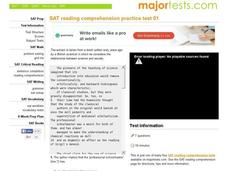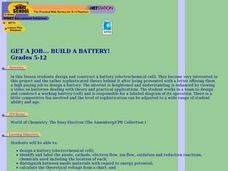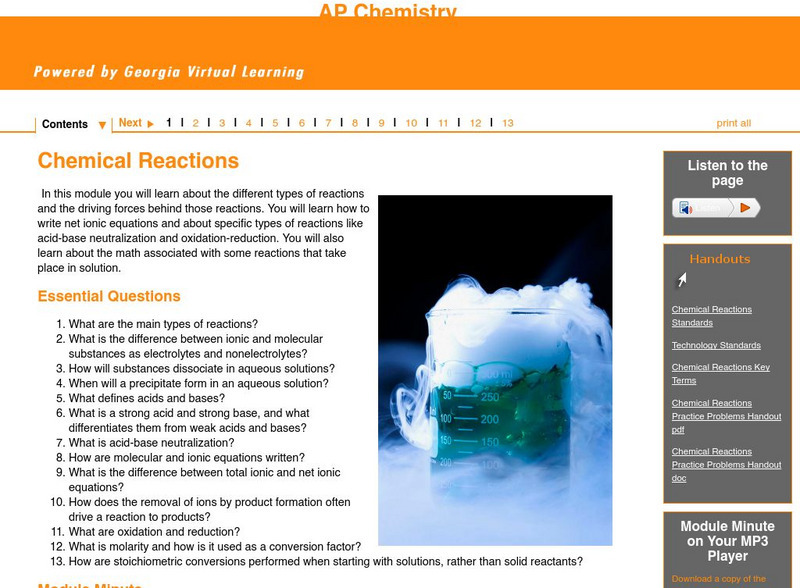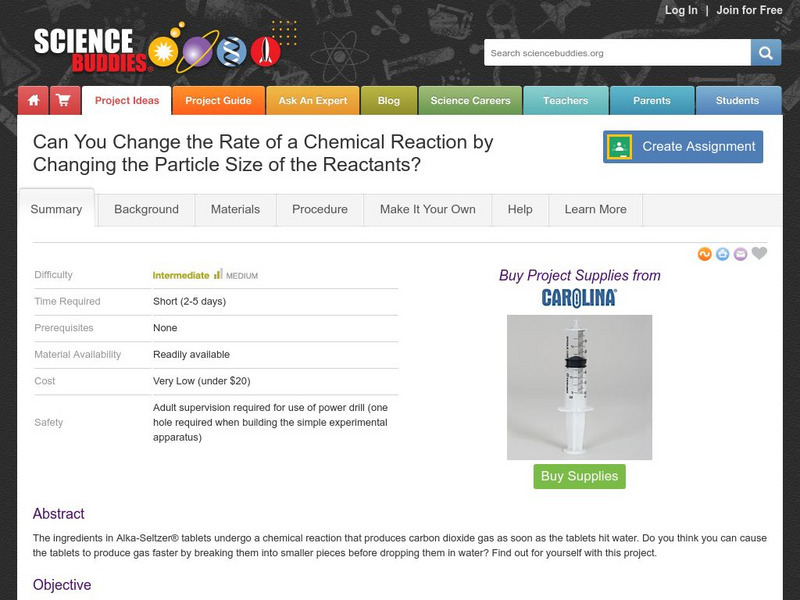Curated OER
A Pre-Treatment Model for Ethanol Production Using a Colorimetric Analysis of Starch Solutions
Students recognize the benefits of ethanol and study photosynthesis. In this ethanol instructional activity students complete an experiment that shows the procedure that starch can be hydrolyzed by salivary amylase.
Curated OER
SAT Reading Comprehension Practice Test 01
In this SAT reading comprehension worksheet, students read an excerpt from a book and answer comprehension questions. Students answer 7 questions and submit their answers in this SAT practice worksheet.
Curated OER
Volcanoes
Students explore the formation of volcanoes. In this earth science lesson, students build their own volcanoes in the lab using different materials. They identify the different types of volcanoes.
Curated OER
Learning how to balance equations
Students play Chembalancer game and balance equations using the trial and error method.
Curated OER
H2O2 Decomposition Lab II
Young scholars conduct an oxidation experiment in which they must determine how much hydrogen peroxide (H2O2) is actually in a store-bought solution of H2O2.
Curated OER
Get a Job.....Build a Battery!
Students design and construct a battery (electrochemical cell). They works in a team to design and construct a working battery and is responsible for a labeled diagram of its operation. This engaging lesson stimulate their creative juices!
Curated OER
Rechargeable Batteries
Students explore how rechargeable batteries work by conducting a series of experiments. In this physics lesson, students discuss the benefits of using rechargeable batteries over disposable ones. They build their own battery charger...
Curated OER
The Blue Bottle: An Example of Teacher-Guided Inquiry
Learners observe a demonstration in which a bottle containing a colorless solution is mixed, turns blue, then becomes colorless again. They record observations, form and discuss hypotheses, and draw a conclusion based on the evidence.
Curated OER
Martian Mummies
Students participate in "Raiders of the Future", a role play about futuristic scientists sending a spaceship to Mars for research and exploration. They collect geological samples for analysis, discover the ruins of an ancient...
Curated OER
The Interactive Periodic Table of the Elements
Students study the different types of metals. In this investigative lesson students watch a demonstration on the effects of temperature on atoms and take a tour through baone matter.
Curated OER
Antacid Lesson Plan
Eleventh graders use titration methods to study properties of antacids. They look at the strength, effectiveness, PH, and effect of supplements taken at the same time. They make observations after the different mixtures are combined and...
Curated OER
Corrosion/Conservation/Preservation
Students examine the reasons why metal corrodes in regard to metal artifacts. In groups, they discover the affects of salt water on metal and compare the type of corrosion found on iron. They also research the types of metal...
Curated OER
Cloud Seeding
In this rain worksheet, students read about how clouds are seeded to produce rain and the substances used for cloud seeding. Then students complete 3 short answer questions.
Curated OER
Micro-Magic With Sticky Ions
Students view a video about the formation of precipitates. They complete a worksheet that asks them to identify what makes a compound form and what holds it together.
Curated OER
pH and Titration
In this pH worksheet, students review the titration procedure and the significance of the stoichiometric point. This worksheet has 2 problems to solve.
Curated OER
Photosynthesis and Respiration
Eighth graders differentiate photosynthesis and respiration. In this biology instructional activity, 8th graders draw a diagram explaining these two processes. They answer a quiz after the instructional activity.
Georgia Department of Education
Ga Virtual Learning: Ap Chemistry: Chemical Reactions
Students discover the different types of reactions, and the driving forces behind those reactions. They learn how to write net ionic equations, and learn about specific types of reactions like acid-base neutralization and...
Georgia Department of Education
Ga Virtual Learning: Chemistry: Chemical Formulas and Equations
In this interactive module, students are introduced to the most fundamental part of chemistry: chemical reactions and the formulas that accompany them.
Khan Academy
Khan Academy: Biology: Chemistry of Life: Chemical Reactions
An article discussing how chemical reactions make and break bonds between atoms.
Science Buddies
Science Buddies: Can You Change the Rate of a Chemical Reaction?
The ingredients in Alka-Seltzer tablets undergo a chemical reaction that produces carbon dioxide gas as soon as the tablets hit water. Do you think you can cause the tablets to produce gas faster by breaking them into smaller pieces...
Chiral Publishing
Chiral Publishing: An Introduction to Chemistry: Process of Chemical Reactions [Pdf]
This chemistry chapter covers everything about chemical reactions. Read about the collision theory, rates of chemical reactions, reversible reactions, and chemical equilibrium. Many pictures and graphs will help to explain the concepts.
Chiral Publishing
Chiral Publishing: An Introduction to Chemistry: Process of Chemical Reactions: Power Point [Pdf]
A great overview of the chemical reactions chapter from "An Introduction to Chemistry". This presentation, available in .pdf format, highlights the main ideas from the detailed corresponding chapter on chemical reactions. Use as part of...
American Chemical Society
Middle School Chemistry: Lesson Plans: What Is a Chemical Reaction?
After observing a demonstration of a chemical reaction between a burning candle and the oxygen in the air, students use atom model cut-outs to model the reaction and see that all the atoms in the reactants show up in the products.
American Chemical Society
Middle School Chemistry: Energy Changes in Chemical Reactions
Students will conduct two chemical reactions: endothermic and exothermic. They will see an animation that shows that it takes energy to break bonds and that energy is released when new bonds are formed, and use that animation to explain...






















![Chiral Publishing: An Introduction to Chemistry: Process of Chemical Reactions [Pdf] eBook Chiral Publishing: An Introduction to Chemistry: Process of Chemical Reactions [Pdf] eBook](https://d15y2dacu3jp90.cloudfront.net/images/attachment_defaults/resource/large/FPO-knovation.png)